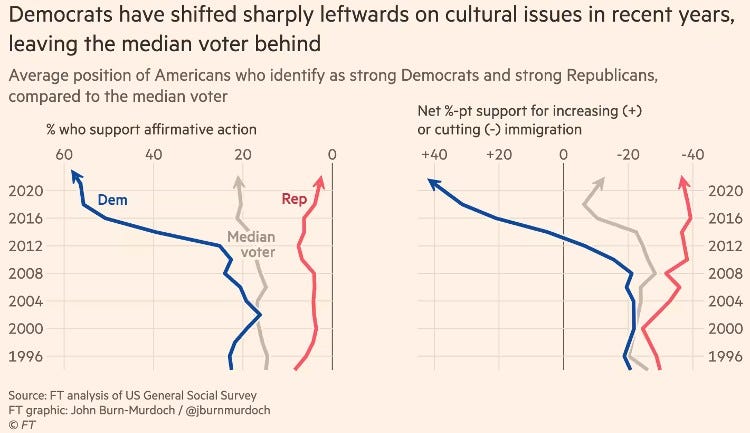It's time to retire this liberal catch phrase
"Why do they vote against their own interests?"
A single-mom Dollar Store cashier votes for Trump. A Mexican-American citizen with undocumented family members. A laid off coal miner. What gives? Why, Democrats want to know, would any of these people “vote against their own interests?”
It can feel surprising and dismaying when someone living paycheck to paycheck— or in fear of ICE—votes for Trump. But this reaction hinges on an assumption: I know them better than they know themselves. If they defy my expectations, they must be in the thrall of false consciousness. This assumption has gotten Democrats and liberals into a world of trouble.
If you want to know why someone voted for Trump, ask them. More than a third of Native Americans and millions of black, Latino, gay, Muslim, Jewish and low-income Americans voted for him, and they all had their reasons. If they don’t think they voted against their self-interest, why second guess them?
People are the experts on their own lives. They may be misled on certain issues by Fox News (as are liberals lodged in their media silo of choice). They may not be following news at all. But every day they wake up and have firsthand, unmediated experiences. And something they’re hearing from the MAGAverse is resonating with those experiences. Something is telegraphing, “We’re your people. We have your back. The Democrats want your vote but they look down on you and call you stupid or racist or toxically masculine.”
Ingenuine though he may be, Trump offers people a kind of political empathy and respect. He acts like he cares that ordinary people are getting shafted and forgotten by a rigged economic system and feel betrayed by the bipartisan establishment’s free trade deals. He acts aggrieved to see them demeaned by liberal elites who say condescending things like, “Why do they vote against their own interests?”
Trump fulfills their interest in being seen and heard. Democrats scold them for being too dumb to know where their true interests lie.
People deserve the basic respect of being treated as people with free will to shape the world they want to live in. This is sorta the basis for democracy.
What’s unfortunate for liberals is that, while public opinion on economic issues skews left, there’s a major disconnect when it comes to social and cultural issues.
Only 39% of battleground disrict voters think Democrats have the “right priorities,” and a staggering 69% say Democrats are too focused on being “politically correct.” According to political scientist Jonne Kamphorst, low-income voters’ perception of the Democratic Party as insufficiently focused on economic issues drives them away from the Left.
“Many working class voters do not perceive the left as advocates for progressive economic policies. Rather, these voters increasingly perceive the left as champions of what they consider ‘elitist’, ‘urban’, or ‘woke’ cultural and identity issues, such as transgender rights or de-funding the police. Consequently, they feel that their own and their communities’ economic problems are not a priority in mainstream left politics…such misperceptions drive voters away from the left, as they may instead vote according to their non-economic preferences, on which they are often conservative. At the same time, this sense of abandonment can foster a loss of faith in democracy, leading to protest voting or abstention from voting altogether.”
So…how do voters decide what’s in their best interest? It may seem baffling for an unemployed black construction worker to vote for Trump, but if that unemployed black guy also happens to be a pro-life evangelical or doesn’t want his kids reading gender nonbinary books in their school library, then how baffling is it? Affluent progressives often “vote against their own interests” for candidates who will raise their taxes, but they vote for them all the same because they have moral, humanitarian concerns having to do with racial justice or Gaza or abortion or any number of other issues. Trump voters are no different. They are, as Substacker Brian Erb noted, "making decisions in a tradeoff environment, and they have multiple and layered self-interests they have to balance.”
Voters’ sphere of attention is not limited to the material. They have moral concerns that sometimes override their material self-interest. Or they sincerely believe that Republicans’ economic policies are more likely to bring them prosperity. Or they lack confidence that either party will really get them on solid financial footing, so they may as well vote their conscience. As Kamphorst notes: “They believe the left does not prioritizes progressive economics and therefore they feel abandoned, turning to the radical right out of protest or because they instead vote according to their less salient cultural conservative attitudes.”
Voters also have social needs—freedom, community, belonging, and a sense of pride and purpose. All of these things are hard to come by in 21st century America, where a high speed internet connection to a digitized universe of avatars and bots is meant to substitute for meaningful social and civic engagement.
People sense that things are going off the rails. Are they wrong? “In a recent AP VoteCast survey, 83% of voters said they wanted either “substantial change” or “complete and total upheaval,” and they broke for Trump by 15 points.
They want change, whether it’s a nostaligic return to an idealized past or some new way of restoring the social contract. They’re ditching the establishment for someone, anyone, who promises to shake things up and recreate the American Dream. That someone was Obama, then it was (almost) Bernie, then it was Trump, the dark mirror reflecting back the sad, shallow and depraved strands of our culture.
In this era of political discontent and social malaise, divining the hearts and minds of a stranger who happens to have voted for the “wrong” candidate is an unproductive endeavor, one that burnishes liberals’ reputation for know-it-all condescension.
You can’t know what’s in someone’s best interest until you talk with them. Obviously.








What a great article—thoughtful, convincing, and fair-minded.
Your point about the limits of self-interest reminds me of my favorite David Hume essay, “Of the First Principles of Government.” Hume argues that people don’t just support their leaders out of self-interest. A leader can only support my interests if they’re in power. But to get power, a leader has to win the “implicit submission” of the general population, not just me. So leaders must either appeal to the *general* interest or to people’s sense of morality (“opinion of right” and “opinion of property”).
It’s a beautifully simple argument. And it’s Hume, so it’s beautifully written, too.
https://davidhume.org/texts/empl1/fp
The thing about this phrase is that it is a true window into an ugly mentality. It presumes to tell grown men and women what their values should be, with the implication that they are too stupid to understand what their betters know to be the right thing, haughtily explained. The condescension is unbearable regardless of the policies in question, and they will not be more attractive just because those same betters change their messaging. The contempt is obvious even if unspoken. If those are good policies, then someone with a better civic attitude is going to have to be the one to persuade and implement them.